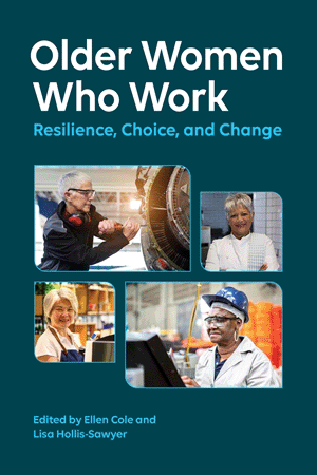A research team of two faculty and one student at Antioch University New England has contributed a chapter to the book Older Women Who Work: Resilience, Choice, and Change, which was published by the American Psychology Association (APA) this September. Titled “Shifting Values and Late Course Adjustments in the Careers of Older Women,” the chapter is full of women’s stories in their own words. It uses a qualitative approach to explore why women continue working into what some consider “retirement age,” especially if they don’t have to keep working solely for financial reasons.
“Our chapter really focuses on what I would call existential issues of meaning, purpose, values, mortality, generativity and legacy (giving to the next generation), and relationships,” explains Dr. Lorraine Mangione who is a professor of clinical psychology at AUNE. She co-wrote the chapter together with fellow clinical psychology professor Dr. Kathi Borden and Elizabeth Fuss, a fifth-year student in AUNE’s Clinical Psychology PsyD.
 Dr. Borden explains that the researchers sent optional prompts to fourteen working women over the age of sixty and “asked them to write narratives either addressing the prompts, or writing whatever they wanted about their later work lives and the meaning of work in their lives.” This qualitative approach was appealing both because it resulted in narratives full of insight and individual experience but also because it allowed a place for the researchers’ own stories. Says Dr. Mangione, “I think that meant a lot to both of us to be able to muse about our own journeys in this chapter. That seemed really important in this book.”
Dr. Borden explains that the researchers sent optional prompts to fourteen working women over the age of sixty and “asked them to write narratives either addressing the prompts, or writing whatever they wanted about their later work lives and the meaning of work in their lives.” This qualitative approach was appealing both because it resulted in narratives full of insight and individual experience but also because it allowed a place for the researchers’ own stories. Says Dr. Mangione, “I think that meant a lot to both of us to be able to muse about our own journeys in this chapter. That seemed really important in this book.”
Older Women Who Work is part of the APA’s Psychology of Women series, providing one of the first in-depth examinations of women age 65 and older who have delayed retirement, exploring personal and career identity, social roles, and quality of life concerns. “The whole book offers an array of diverse older women who work and the issues they confront, and really feels like a very positive view of a group that has been stigmatized and stereotyped,” says Dr. Mangione. She thinks that today is a particularly interesting time to study older women in the workforce as the Baby Boom cohort contains “the first generation of women to enter the world of work en masse and remain in it over their lifetime, so work perhaps held special significance for them/us.”
The research participants ranged from artists and writers to medical workers, from teachers to businesspeople. This diversity resulted in narratives that “were wonderful and full of interesting personal history and anecdotes,” says Dr. Borden. “This was a really enjoyable project.”Altogether, says Dr. Mangione, the book expresses “something very vibrant and alive about older women, a group that is often dismissed, deemed irrelevant, and ignored.” By contributing this chapter, the authors are joining in the project of making psychology more inclusive and complete. As Older Women Who Work reaches its readers, says Dr. Mangione, it promises to “enlighten practitioners and researchers in other age groups.”




